Beowulf
 for intense sequences of violence including disturbing images, some sexual material and nudity.
for intense sequences of violence including disturbing images, some sexual material and nudity.
Reviewed by: Michael Karounos
CONTRIBUTOR
| Moral Rating: | Extremely Offensive |
| Moviemaking Quality: |
|
| Primary Audience: | Teens Adults |
| Genre: | Animation Fantasy Adventure Adaptation |
| Length: | 1 hr. 53 min. |
| Year of Release: | 2007 |
| USA Release: |
November 16, 2007 (wide) |
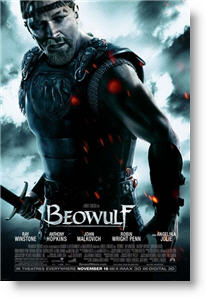
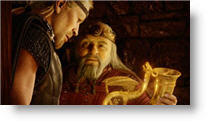
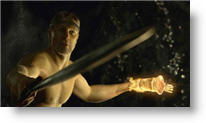
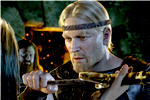
What is true love and how do you know when you have found it? Answer
How can I deal with temptations? Answer
Should I save sex for marriage? Answer
What are the consequences of sexual immorality? Answer
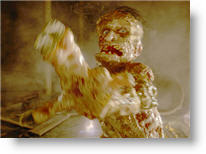
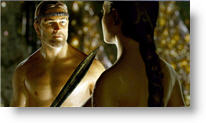
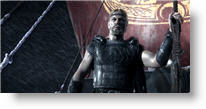
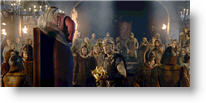
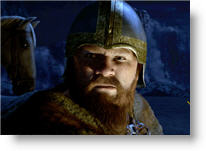
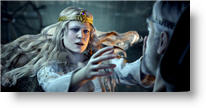
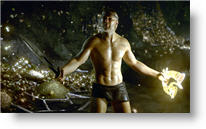
| Featuring |
|---|
|
Ray Winstone “The Departed,” “Cold Mountain” Anthony Hopkins “Fracture,” “The Silence of the Lambs,” “Hannibal” John Malkovich, Robin Wright Penn, Brendan Gleeson, Crispin Hellion Glover, Alison Lohman, Angelina Jolie, Sharisse Baker-Bernard, Richard Burns, Chris Coppola, Kevin Dorman, Shay Duffin, Greg Ellis, Leslie Harter Zemeckis, Nick Jameson, Emily Johnson, Dominic Keating, John Littlefield, Chris Mala, Sebastian Roché, Charlotte Salt, Woody Schultz, Randy Shelly, Tyler Steelman, Nadine Stenovitch, Tim Trobec, Jared Weber, Tom West, Rik Young |
| Director |
|
Robert Zemeckis “Back to the Future,” “Back to the Future Part II,” “Back to the Future Part III,” “Cast Away” |
| Producer |
| Roger Avary, Steve Bing, Steven J. Boyd, Neil Gaiman, Buzz Hays, Josh McLaglen, Jack Rapke, Roger Roberts, Martin Shafer, Steve Starkey, Peter M. Tobyansen, Robert Zemeckis |
| Distributor |
“Pride is the curse.”
Like the pathetic version of the Beowulf legend released in 1999, and like the pathetic one released in 2005, this recent incarnation grovels in moral relativism.
In the 1999 version, Beowulf says:
“Our evil has drawn us together. I’m like you. I’m one of the damned.”
In the 2005 version, Beowulf says,
“We’re all killers.”
In the 2007 version, Beowulf says,
“We’re all monsters.”
It is comforting to know that all three filmmakers are consistent in their degraded perspective of heroism and that all three agree that Man is inhuman. Fortunately for the rest of us, that perspective isn’t in the ancient text which adulates heroism, deprecates evil, and glorifies God.
The twice-stated premise of the movie is that the “sins of the fathers” are visited on the sons. Without giving away the details of the interesting twist lent to the ancient story by writers Neil Gaman and Roger Avary, the particular sin is lust which eventually causes the death of the three men who the movie carefully portrays as suffering from it.
The movie succeeds in its portrayal of a Beowulf (Ray Winstone) who is masculine, heroic, and convincingly conflicted without being emasculated, as Gerard Butler’s character was in “Beowulf and Grendel” (2005). At the same time, it is hard to take the animated Beowulf seriously when he moves like a stop-action cartoon and repeatedly displays his naked backside to the audience. It is a perspective that is not of primary interest to prurient women and is of no interest to heterosexual men. (This is especially true of the naked and overweight, bearish rear end of Anthony Hopkins, the sight of which can only appeal to a certain constituency which shall remain unnamed here.)
Similarly to the 2005 film, this most recent Beowulf subtly debases whatever is masculine in culture—heroism, husbandry, and fatherhood—while simultaneously glorifying the feminine. Women lust without penalty in this “Beowulf,” including the teenage wench who is Beowulf’s mistress. Rather than suffer for her transgression, she is actually comforted by the queen. Meanwhile, the queen is unforgiving of her hero/husband, Beowulf’s sin. Likewise, the serving wenches lust after Beowulf without penalty, but one of Beowulf’s warriors is killed when his lust for a wench gets the better of his common sense. In this movie, sexual transgression is all on the part of the men. The women are portrayed as innocent victims of men’s lust.
The character of Angelina Jolie as Grendel’s mother is similar to that of Sarah Polley as the witch in the 2005 movie in that she is the one whose metaphysical and sexual powers are greater than Beowulf’s. At one point, the beautiful demon grasps Beowulf’s uplifted sword and causes it to suggestively melt in her hand. In both movies, the women are more powerful than the men, purer than the men, and are both redeemed and redemptive, whereas the men are “damned” or simply weak.
More disturbing than the one-sided feminist portrayal of men as weak and venal is the persistent anti-Christian bigotry that seeps into, it seems, everything Hollywood produces. The first Christian reference in the movie occurs when John Malkovich and another character discuss Jesus while urinating at length. I’m sure that scene caused gales of laughter in the blue states, because there’s nothing more hilarious than making fun of the Jesus-believing rubes. Subsequent scenes show a grim Christian escort to the queen, a groveling convert (Malkovich), a burning cross tumbling in slow motion into the ruins of a church, and a decision not to pray to Jesus.
Later, a character, I believe, Beowulf says,
“The time of heroes is dead. The Christ God has killed them.”
Nietzsche was famous for saying that Christianity was a weak religion and had killed the unbridled Dionysian spirit in man which allows him to be a “superman.” It is typical of the confusion of the postmodern left that it cannot make up its mind. Is Christianity weak and insipid or is it murderous and powerful? Is lust a good thing or is it a sin to be punished even outside of a Christian context? Aren’t men supposed to be “supermen” or are women more powerful? These contradictions make ridiculous the premises of a movie which can’t think straight but, like the pigs in Animal Farm, can only bleat mindless formulations, in this case: “Men bad; women good.”
The movie, at its heart, evinces a secular Puritanism that is radically feminist. Simply put, sex is bad. There is no sex between Hrothgar and his wife Wealtheow; there is no sex between Beowulf and Wealtheow; the sex between Beowulf and his child-mistress reflects poorly on him (though not on her); sex with Grendel’s mother is always good for her and always bad for the man who has it with her. Marriage is a cursed state; a state without men, whether as demon or queen, is morally purifying. This is similar to the 2005 movie in which the witch has voluntary sex with the troll, but slaps and rapes the weak-willed Beowulf.
One of other ways the movie manages to have its cake and eat it too is to show extended scenes of a naked Angelina Jolie and still retain a PG-13 rating. Many reviewers said that this technology is the wave of the future. Perhaps it is, although there were many awkward moments when the movie played like a cartoon, and it was impossible to ascribe the on-screen emotions to anything human.
However, if filmmakers can show male and female nudity with impunity and still retain a PG-13 rating, then you can be sure there will be many more movies like this one, showing the naked form of Angelina Jolie. Watching her is not as disturbing to a Christian as watching the naked Mystique in the third X-Men, but director Zemeckis clearly understands that what is going to sell the movie is not the cheesy 3D action but the opportunity to see a PhotoShopped Jolie naked as a doll. Her character is mesmerizing because she seems less than human and more than animation. She’s a walking, talking soft-core porn illustration of a beautiful woman.
Technically, the movie is full of amateurish attempts to produce scenes of horrifying gore. It is as if Zemeckis asked the opinion of a room full of 13 year old boys what was the grossest kind of violence to depict, and they responded “Stab things in the eye!” There are at least three times when Beowulf stabs creatures in the eye, and actually comes through one of those times. This allows Zemeckis to drip 3D gore onto the audience, but because it is so over the top, the audience can’t relate the experience to anything imaginable and is unaffected. The better moments are those such as the rain falling, but even that is made ludicrous by the fact that the audience can see 3D rain falling on itself, but the character’s helmet remains perfectly dry!
The character of Grendel is poorly conceived. He is neither horrifying nor disgusting, but comes across as a bad artist’s attempt to depict both. The only interesting aspect of Grendel in the movie is when he converses in Old English with his mother and shows his childish, i.e. victimized, nature. Once again, Man is the evil, and the evil is Victim. We saw all that in the 2005 movie and tire of having to see the same, dull, ideological sermon over and over again.
This year’s version of Beowulf is anti-Christian, misanthropic, full of nudity, but otherwise childish in its conceptions. As always, read the book to learn that:
Blessed God
out of his mercy this man hath sent
to Danes of the West, as I ween indeed,
against horror of Grendel.And to know that:
God is able
this deadly foe from his deeds to turn!
As well as to read some 38 other reverent references to God whose spirit and truth are entirely absent from this abortive attempt to portray both Man and God in an honest manner.
Violence: Extreme / Profanity: Minor / Sex/Nudity: Extreme
See list of Relevant Issues—questions-and-answers.


Extremely Offensive / 2
Extremely Offensive / 1
Extremely Offensive / 4
Moral rating: Offensive / Moviemaking quality: 2
After reading a review and had the opportunity to view it in 3D at our local multiplex, I was amazed by the realism and gripping dialogue, I was sold, especially with the character Wiglaf (Brendan Gleeson). Remember the dead eye of POLAR EXPRESS, Wiglaf have the most authentic detail and life that he looks so real compare to all the other characters, including leading character Beowulf (Ray Winstone). He reminds me of Gimli from LOTR trilogy portrayed by John Rhys-Davies. REAL D, the technology behind the 3D effect is just amazing. It is not the old anaglyph of red and blue shades where it can become uncomfortable.
As stated above, this film is not intended for children, and unfortunate for the parent(s) who brought their little one in the theater where I attended. The poor kid was crying. There were nudity for both male and female. Blood and gore with fast paced action, and a scene depicting suicide.
The script by Nail Gaiman (“Mirror Mask”) and Roger Avary (“Pulp Fiction”), surprisingly turned in a morally sound story. They even mentioned Christ and as the film progresses toward the end, the cross takes prominent stage. Unferth (John Malkovich) is seen wearing the cross as Christianity had evidently spread through out the land. Unferth uttered what we have already know/suspected of Beowulf’s transgression.
Though the story is Hollywood manipulated, it has brought an interest in me to revisit the original work of Beowulf.
Average / 4
Very Offensive / 3
For the 3D viewing experience and otherwise good plot, “Beowulf” is a decent film. I enjoyed it; it is a different experience, much like this year’s “Grindhouse” was for me. For the casual adult viewer, I recommend going to see it on this basis or even on the basis of action or an epic story.
Offensive / 4
Offensive / 4½
Offensive / 2½
The idea that Christianity and Christians are weak is a secondary theme throughout. Rarely do I see a film with such blatant anti-Christian moments. This theme is progressed with contrasts between the hero Beowulf and references to the non-heroic / emasculated actions of Christians. Specifically, Unferth (John Malkovich) is contrasted against Beowulf throughout the film. Unferth is a coward who flees from the monsters terrorizing his village, whereas Beowulf is the hero who conquers the beasts. At the conclusion of the work Unferth has become a slave owning/beating Christian priest who is still just as cowardly as ever, yet Beowulf is the heroic king whose well deserved fame has spread throughout the land. This contrast summarizes the heroic idolization and the not-so-subtle anti-Christian theme apparent throughout the film.
Nudity is present in the film. Angelina Jolie portrays a monster, and although she is not nude per-se, she is shown fully unclothed multiple times. Her anatomy is moderately distorted (take the anatomy of an undressed Barbie doll, make it more realistic, and put it in 3D), but she appears nonetheless nude. Ray Windstone also appears nude (and accompanied by multiple phallus innuendoes), but is shown only from the back. Put in other words, the film really leaves the imagination with no room to wander for either of the actors.
As for violence, there is no more than what is seen in other current movies. Strikingly less violence is seen than that which appears in the movie “300.” Most violence is portrayed by monsters killing humans or by humans killing monsters.
A plot is relatively absent. The film erred on the side of crowd pleasing with a presentation in 3D and spectacular special effects. But, such special effects are only expected by the current eight dollar paying movie-goer, so all the film really has going for it is a presentation in 3D. Regarding character depth, Beowulf (Ray Windstone) and his queen (Robin Wright Penn) seemed to demonstrate some towards the end of the movie, but all other characters lacked depth completely.
In summary, the film has no redeeming qualities. The market for the movie is unmistakably teenage boys with no desire to critically think about what they view. Just imagine what that does to a film.
Very Offensive / 2½
But Beowulf proves to be no real hero. He is prideful, lustful, and arrogant. He falls as Hrothgar fell, taking the easy road to glory. He secures his fame in a devil’s bargain with Grendel’s demon mother (Angelina Jolie). Though he does gain power, the knowledge of this bargain eats away at Beowulf, and ultimately his bargain demands his life to free the land of the consequences of his mistakes.
Great praise has to go to the effects wizards behind the film. Creating a digital film as convincing as this is no small feat, and really showcases how good digital wizardry has gotten. With the cutting-edge 3-D effect, the film is quite breathtaking, especially when it goes into its heart-pounding action sequences. The best part of the film, however, is the creation of the monster Grendel. He is a repulsive, horrifying creature, but carries with him such profound tragedy. In a film full of humans, it is he that brings out the strongest emotional response.
Unlike some reviewers here, I don’t quite believe that the film ever had any strong anti-Christian overtones. Indeed, there is a Christian/pagan juxtaposition, but beyond a few snide references on the pagans' part, I don’t think we’re meant to take away a strong anti-Christian slant. If anything, Christianity seems to provide a source of conviction in the film.
However, this film has a strong deal of content, both violent and sexual. In truth, BEOWULF should be rated-R. The violence is intense and sometimes quite grotesque, and the sexuality is present throughout in dialogue. The moment where Grendel’s monstrous mother takes on the form of a naked woman to tempt Beowulf should also give Christian viewers some pause; although none of her private parts are truly seen, nothing is really left up to the imagination, either, and the camera dwells on her form quite a bit.
Offensive / 4
Average / 3
Average / 5
There seemed to be an inevitability to the mens actions—a perpetual cycle of moral compromise and destructive back-lash. The most noble character, the queen, seems powerless to intervene—she simply watches on sadly as the men struggle and fight. In a way the story says the demon wins—or at least, sin prevails.
There seems to be little hope of redemption or true breaking off of the cycle of sin—no forgiveness and repentance. The conclusion has to be that we need a real hero, a saviour who will break the consequences of sin and death off us forever—otherwise we are doomed.
Offensive / 4
The poem itself was written down, from it being orally told to hundreds of years by Monks. They added a lot of their own beliefs into it, as any good volume of the poem will point out in introduction. So, if anything, the poem itself is not correct.
The movie itself was excellently produced. Most of the movie, I had forgotten that it was a cartoon. No, I did not bring my eleven year old daughter. Because, the movie was not for children, it was for adults, especially my generation, which grew up on cartoons and still enjoys watching them. The writing was, as everything Neil Gaiman touches, golden. Characters were well developed. The film was well plotted out.
I would have to say I have not smiled so much in the cinema for a very long time. It was fun to see “Beowulf” on the big screen. I really enjoyed how they showed the fallen hero find redemption. He is a lot like David from the Bible. Both of them were very human, at times very weak. Both of them found redemption, and we as Christians, and people, can learn very good lessons from them. I would encourage anyone 14 and up to view this film and learn from it. I would encourage Youth groups to attend this film and afterward have a nice discussion about it. Compare it to Biblical heros and also to our own lives. Perhaps we do not fight monsters, but we do fight other just as frightening things in our lives. We all do have weak moments and mostly we all come out the better for it in the end. I thank God for this movie. It will show us a lot if we allow it to.
Good / 5
The only part of the movie I wasn’t too nuts about was the portrayal of Grendel’s Mother (the not clothed, but gold-covered Angelina Jolie). The movie deviates from the poem here, but it does play out in the movie’s favor. The whole religious quandary here is simple and entirely NOT offensive. The line 'The time of heroes has ended, the Christ-God has killed it,' is only offensive if you don’t let that steak marinate. Saying that the life of Christ has made us humans feel more like humble beings and servants of God is not offensive. People don’t need a mortal superhero, they need a loving Father. This statement is entirely true. Don’t just read the statement and think it comes with negative connotations. I’ll say it again, Christianity is NOT negatively portrayed in “Beowulf.” For any action-film fan, or fan of the ancient poem, “Beowulf” is an exceptionally enjoyable film, with some scenes that are a little mature for the average 13 year-old. See it, and enjoy it—especially in 3D.
Offensive / 4½
The story was good but had an awkward flow in the beginning. A 10 minute slaughter scene and then with in a minute a man is announced heir to the throne and then becomes king. Take out some of the action and flesh out the more important parts a bit more. The best parts of the movie though were surprisingly the slowest, calmest scenes. I would have loved to see more of those.
The part that ruined it for me though was the first half of the movie. Not at all what I expected. I found it quite graphic and disturbing especially for a PG film (here in Canada or at least at this theatre). I felt really bad when I dragged a couple of my friends into the movie who do not at all like that sort of stuff. The monster Grendel was very disturbing and his graphic slaughters were non-stop. I’ve seen worse in live action but somehow this was different.
Overall, it was a decent film. Without the dragged out graphic violence at the beginning it could have been much much better. As a Christian, I feel this movie was totally against my beliefs and I should have walked out although, the second half was much better. My conclusion—wait until it’s on DVD. You won’t really be missing anything unless you manage to watch it in 3-D. The medium was eye candy, but the way it was used is a shame. Zemeckis—please make another film using this animation style. Make it fantastical and epic but emphasis the drama. Slow moments will make or break the film. They were strong in Beowulf and in a good film they could be exceptional.
Very Offensive / 4
*Being a big Zemickes fan,I wanted to see the film when I first saw the trailer.
*There were some moments that made obvious bad references to Christianity, however considering the historical basis of the film those things didn’t offend me.
*However, a big thing was Jolie’s scenes where she only had gold liquid covering her “parts.” These I did have a problem with and had to cover my face.
All in all, I hope anyone wanting to will go see this film, to me it was just a nice lay back and watch movie. However, do not take kid younger than 16.
Average / 4
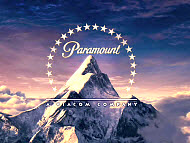
However, this movie we saw was at best a mockery of what the original epic poem portrayed. A continuous theme throughout the movie was the slandering of the “Christ God.” They continuously praised men, who cheated and lied, and then deemed them as heroes. Even she said as we were leaving, “That wasn’t a hero—that was a jerk. How could they praise him as being worthy for remembering through history?”
Outside of the extremely blatant nudity and graphicness of the film, which were absolutely not needed, this story degenerates one of the most powerful and compelling epic poems in history.
Over and over in the epic poem true glory is given to God—when relating the battle with Grendal’s mother—“But the Wielder of Men granted me that I should see hanging on the wall a fair, ancient great-sword” Hrothgar to Beowulf on the subject of Hermod—“he turned away from the joys of men, alone, notorious king, although mighty God had raised him in power, in the joys of strength, had set him up overall men”
Grendal upon being referred to as a son of Cain “the hostile-hearted creature, God’s enemy, guilty of murder.” These themes, of God and Christianity and an acknowledgment of from where all things are given are repeated often throughout the epic. To see this movie mock the ideals of the original by blasphemy, by encouraging and highlighting those actions which are sin (adultery, envy, deceit, boastfulness) and by creating an environment where man is set upon a pedestal above all else was enough to turn my stomach. There is nothing of the truth in this movie—it is pure sensationalism at it’s absolute worst.
My Ratings: Extremely Offensive / 4½